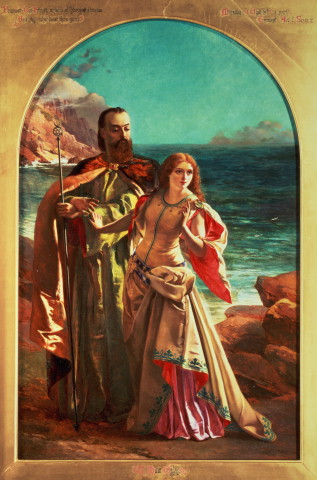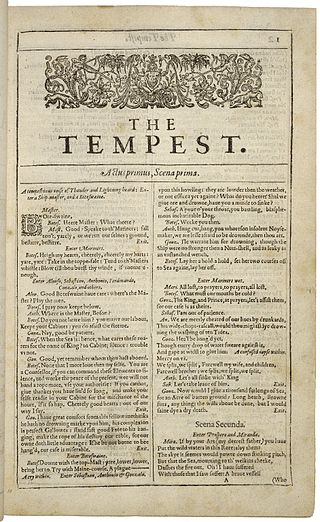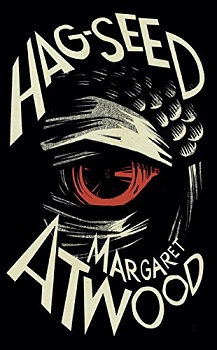
Prospero is a fictional character and the protagonist of William Shakespeare's The Tempest.
Caliban, son of the witch Sycorax, is an important character in William Shakespeare's play The Tempest.

Jacqueline A. Carey is an American writer, primarily of fantasy fiction.

Miranda is one of the principal characters of William Shakespeare's The Tempest. She is the only female character to appear on stage.

Prospero's Books is a 1991 British avant-garde film adaptation of William Shakespeare's The Tempest, written and directed by Peter Greenaway. Sir John Gielgud plays Prospero, the protagonist who provides the off-screen narration and the voices to the other story characters. As noted by Peter Conrad in The New York Times on 17 November 1991, Greenaway intended the film “as an homage to the actor and to his 'mastery of illusion.' In the film, Prospero is Shakespeare, and having rehearsed the action inside his head, speaking the lines of all the other characters, he concludes the film by sitting down to write The Tempest.”
The Tempest is an opera by English composer Thomas Adès with a libretto in English by Meredith Oakes based on the play The Tempest by William Shakespeare.

The Tempest is a 1979 film adaptation of William Shakespeare's play of the same name. Directed by Derek Jarman, produced by Don Boyd, with Heathcote Williams as Prospero, it also stars Toyah Willcox, Jack Birkett, Karl Johnson and Helen Wellington-Lloyd from Jarman's previous feature, Jubilee (1977).

Sycorax is an unseen character in William Shakespeare's play The Tempest (1611). She is a vicious and powerful witch and the mother of Caliban, one of the few native inhabitants of the island on which Prospero, the hero of the play, is stranded.

Stephano is a boisterous and often drunk butler of King Alonso in William Shakespeare's play, The Tempest. He, Trinculo and Caliban plot against Prospero, the ruler of the island on which the play is set and the former Duke of Milan in Shakespeare's fictional universe. In the play, he wants to take over the island and marry Prospero's daughter, Miranda. Caliban believes Stephano to be a god because he gave him wine to drink which Caliban believes healed him.

Ariel is a spirit who appears in William Shakespeare's play The Tempest. Ariel is bound to serve the magician Prospero, who rescued him from the tree in which he was imprisoned by Sycorax, the witch who previously inhabited the island. Prospero greets disobedience with a reminder that he saved Ariel from Sycorax's spells, and with promises to grant Ariel his freedom. Ariel is Prospero's eyes and ears throughout the play, using his magical abilities to cause the tempest in Act One which gives the play its name, and to foil other characters' plots to bring down their master.

The Tempest is a 2010 American fantasy comedy-drama film based on the 1611 play of the same name by William Shakespeare. In this version, the gender of the main character, Prospero, is changed from male to female; the role was played by Helen Mirren. The film was written and directed by Julie Taymor and premiered at the Venice Film Festival on September 11, 2010.

Voyage to Melonia is a 1989 Swedish-Norwegian animated adventure fantasy film directed by Per Åhlin, loosely based on William Shakespeare's The Tempest, with further inspiration from Jules Verne's Propeller Island and Charles Dickens' Oliver Twist. It was Åhlin's first fully animated feature film, as his earlier films Out of an Old Man's Head and Dunderklumpen! had both used a mix of animation and live action.
Ferdinand is the prince of Naples and the son of Alonso, the King of Naples, in Shakespeare's play, The Tempest. He falls in love with Miranda. He is quick to promise the title of queen and wife to Miranda even though he doesn't know her name. He is happy in humble labours, blinded by love. He makes a solemn vow to be truthful to Prospero, and not to violate Miranda's chastity before their wedding.

The Tempest is a play by William Shakespeare, probably written in 1610–1611, and thought to be one of the last plays that he wrote alone. After the first scene, which takes place on a ship at sea during a tempest, the rest of the story is set on a remote island, where Prospero, a wizard, lives with his daughter Miranda, and his two servants: Caliban, a savage monster figure, and Ariel, an airy spirit. The play contains music and songs that evoke the spirit of enchantment on the island. It explores many themes, including magic, betrayal, revenge, and family. In Act IV, a wedding masque serves as a play-within-a-play, and contributes spectacle, allegory, and elevated language.
Une Tempête is a 1969 play by Aimé Césaire. It is an adaptation of Shakespeare's The Tempest from a postcolonial perspective, set on an island in the Caribbean. The play was first performed at the Festival d'Hammamet in Tunisia under the direction of Jean-Marie Serreau. It later played in Avignon and Paris. Césaire uses all of the characters from Shakespeare's version, with some additions and new renderings of the original cast.
L. Jagi Lamplighter is an American children's and fantasy children's writer and editor.

Hag-Seed is a novel by Canadian writer Margaret Atwood, published in October 2016. A modern retelling of William Shakespeare's The Tempest, the novel was commissioned by Random House as part of its Hogarth Shakespeare series.

The Tempest is a 1908 British-made silent film directed by film pioneer Percy Stow who specialised in trick photography.

The Greenhollow Duology is a series of two fantasy romance novellas by Emily Tesh. The first entry in the series, Silver in the Wood, won the 2020 World Fantasy Award for Best Novella.

Shakespeare's Shitstorm is a 2020 American musical comedy horror film written and directed by Lloyd Kaufman. Produced by Troma Entertainment, it is a contemporary parody of William Shakespeare's The Tempest.















